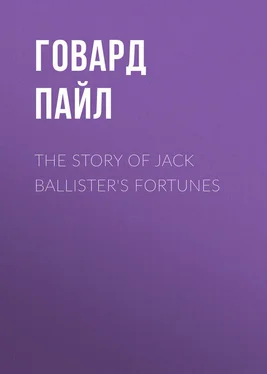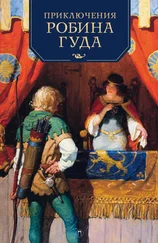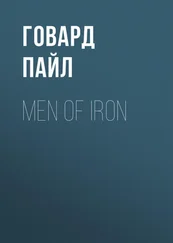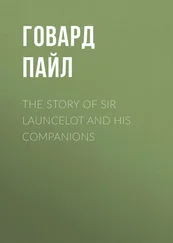Говард Пайл - The Story of Jack Ballister's Fortunes
Здесь есть возможность читать онлайн «Говард Пайл - The Story of Jack Ballister's Fortunes» — ознакомительный отрывок электронной книги совершенно бесплатно, а после прочтения отрывка купить полную версию. В некоторых случаях можно слушать аудио, скачать через торрент в формате fb2 и присутствует краткое содержание. Издательство: Иностранный паблик, Жанр: foreign_antique, foreign_prose, на английском языке. Описание произведения, (предисловие) а так же отзывы посетителей доступны на портале библиотеки ЛибКат.
- Название:The Story of Jack Ballister's Fortunes
- Автор:
- Издательство:Иностранный паблик
- Жанр:
- Год:неизвестен
- ISBN:нет данных
- Рейтинг книги:5 / 5. Голосов: 1
-
Избранное:Добавить в избранное
- Отзывы:
-
Ваша оценка:
- 100
- 1
- 2
- 3
- 4
- 5
The Story of Jack Ballister's Fortunes: краткое содержание, описание и аннотация
Предлагаем к чтению аннотацию, описание, краткое содержание или предисловие (зависит от того, что написал сам автор книги «The Story of Jack Ballister's Fortunes»). Если вы не нашли необходимую информацию о книге — напишите в комментариях, мы постараемся отыскать её.
The Story of Jack Ballister's Fortunes — читать онлайн ознакомительный отрывок
Ниже представлен текст книги, разбитый по страницам. Система сохранения места последней прочитанной страницы, позволяет с удобством читать онлайн бесплатно книгу «The Story of Jack Ballister's Fortunes», без необходимости каждый раз заново искать на чём Вы остановились. Поставьте закладку, и сможете в любой момент перейти на страницу, на которой закончили чтение.
Интервал:
Закладка:
This affair created, as was said, a good deal of talk at the time.
In the year 1719, beginning in February and ending in November, Hezekiah Tipton sent away to the American colonies or plantations in all over five score servants.
One day early in March, a company of nineteen men who had volunteered to emigrate to the Virginias was brought up from London to meet the brig Arundel at Southampton. They were quartered at the Golden Fish Inn, and during the morning the old America merchant went to look them over. The men were ranged in a row along by the wall of the inn yard, and the old man walked up and down in front of the line, peering at each man with half-shut eyes and wrinkled face, while a few people from the inn stood looking on with a sort of inert interest. He did not seem very well pleased with the appearance of the servants. There were only nineteen, and there should have been one and twenty. The agent explained that there had been twenty-one of them when he wrote from London, but that one of them had run away during the night, and that another would not sign the papers. “‘Twas,” said he, “as fine, good a young lad of sixteen or eighteen as ever you see. But his mother, methinks it was, comes in crying at the last minute and takes him away from under our werry noses, so to speak.” Hezekiah grunted a reply as he walked up and down along the row of grinning, shuffling men, looking them over. The big knotted joints of the old man’s fingers gripped the cracked and yellow ivory head of his walking-stick, which he every now and then tapped, tapped on the stones of the court-yard. “That man,” said he, in his cracked, querulous voice, poking his walking-stick as he spoke at a lean little man standing in the line – “that man – why did ye bring him? How much d’ye think he’ll fetch in the Virginias? I’s warrant me not fifteen guineas.”
“Why, Master Tipton,” said the agent, referring to a slip of paper which he held in his hand, “there you are mightily mistook. Maybe, like enough, that man is worth more than any of ‘em. He’s a skilled barber and leecher, and a good man he is, and knows his trade, to be sure, and that werry well. Just you think, Master Tipton, how much he might be worth as a vally or body-servant to one of them there Virginia planters.”
“Humph!” grunted the old man, and he shook his lean head slowly from side to side. “I’ll tell you what it is, Master Dockray,” he said again, after a while, “they be not nigh so good as those I had last – and only nineteen where there should have been one and twenty.” The agent made no answer and the old man continued his inspection for a while. He did not say anything further, and by and by he turned away and, with the agent at his heels, entered the inn to receipt the papers, and with his going the inspection came to an end.
Finally, in making you acquainted with old Hezekiah Tipton, it may be said that he was a notable miser of his time. To see him hobbling along the street in his snuff-colored coat, threadbare at the seams, and here and there neatly patched and darned, one might take him, perhaps, for a poor decent school-teacher of narrow means, but certainly not for one of the richest men in the county, as he was reputed to be. There were a great many stories concerning him in Southampton, many of them doubtless apocryphal, some of them based upon a foundation of truth. One such story was that every Sunday afternoon the old man used to enter into his own room, bolt the door, and spread gold money out on the floor; that he would then strip himself and roll in the yellow wealth as though taking a bath. Another story was that he had three iron chests in the garret of his home, each chest bolted to the floor with iron bolts. That the one chest was full of Spanish doubloons, the second full of French louis d’ors, the third full of English guineas. The Southampton tradesmen used to say that it was more difficult to collect their bills from Hezekiah Tipton than from almost any one in the town.
CHAPTER II
JACK BALLISTER
JACK BALLISTER at this time was a little over sixteen years old, and had now been living with his uncle Tipton something over two years.
Jack’s father at the time of his death had been vicar of Stalbridge for nearly nineteen years, so that Jack, until he had come to Southampton, had never known anything but that part of Wiltshire which immediately surrounded Stalbridge and Stalbridge vicarage. The only other inmates of the vicarage were old Janet, the housekeeper, and a farmer’s daughter who helped about the house, and old Giles Cobb, who came up now and then to work in the garden.
There was, by the way, always a singular charm to Jack in the memories of this garden. Some of his earliest recollections were of playing out in the tangled sunny reaches while old Giles bent, with stooping shoulders and rounded back, over his work, digging and planting and picking about at the weeds in the brown, loamy beds. There was a yew hedge, and two bee hives that stood under a cherry tree, and a row of two or three cucumber frames that lay bright and shining, reflecting in their glassy surface the clouds and the warm sky above. There was always an association of flowers, of birds, and of warm yellow sunlight about the tangled, flowery space, and in the years afterwards, when Jack visited the old vicarage, one of the first places he went to was the garden. It looked strangely familiar yet strangely unfamiliar. It seemed more unkempt and uncared for. The birds were singing in the trees over beyond the hedge, but the two straw-thatched bee hives were gone. Nevertheless he could almost fancy that old Giles with his hunched shoulders and his smock frock might at any moment come in through the gate, trundling his squealing wheel-barrow before him.
Jack was not quite four years old when his mother had died. It seemed to him that he could remember her, yet the image he held in his mind might not have been an actual memory, but only some strong association connected with things that Janet had told him about her. Yet it seemed to him that he really did hold a mental impression of her in his memory of early things, an impression of a large, tender, shadowy figure, dressed in black, and with a white kerchief or shawl around her shoulders. He could almost fancy that he could remember a peculiar fragrance that lingered about the folds of her dress – a fragrance like that of the old lavender chest where Janet kept the house linen. This recollection of his mother might have been only an image conjured up out of what had been told him concerning her, but, as was said, it always seemed as though it were a real and living memory. It is sometimes difficult to tell where fancy ends and memory begins in those broken fragments of recollections of early childhood.
It seemed to him that the same figure was present in the memory of a certain time when he, as a little, little boy, had fallen down the steps and cut his chin. It seemed to him that it was she who had comforted him, singing to him while she scraped a crisp half-apple and fed him with the pulp from the point of a knife. Janet had said that that fall had not happened until the year after his mother’s death, but it seemed to Jack that it was his mother’s presence that had filled the memory of the accident, and he always felt that maybe it was Janet who was mistaken, and not his own recollections of the trivial event.
He often thought of his mother, as a motherless boy is apt to think of that missing presence, and it seemed to him that if she had only lived he would have loved her very much, and that his life would have been much sweeter to him.
Janet often talked to him about her. His grandmother, Janet told him, had adopted her as a little girl, and had brought her up with her own daughter, who was now Lady Arabella Sutton. She had been, Janet said, more of a companion than a waiting-maid. Of these stories of by-gone times, that children so delight to have told to them, Jack would make Janet tell him most often of the great family quarrel that had happened when his father had told the others that he and Anne Tipton were going to be married. Janet always made the most out of the story, embellishing it more and more as the years passed by, and as her imagination suggested new details. “Indeed,” she would maybe say, “you should ha’ seen him stand up before your grandmother, as grand as you please, with his arms folded so. ‘A Ballister, madam,’ says he, ‘can marry where he chooses.’”
Читать дальшеИнтервал:
Закладка:
Похожие книги на «The Story of Jack Ballister's Fortunes»
Представляем Вашему вниманию похожие книги на «The Story of Jack Ballister's Fortunes» списком для выбора. Мы отобрали схожую по названию и смыслу литературу в надежде предоставить читателям больше вариантов отыскать новые, интересные, ещё непрочитанные произведения.
Обсуждение, отзывы о книге «The Story of Jack Ballister's Fortunes» и просто собственные мнения читателей. Оставьте ваши комментарии, напишите, что Вы думаете о произведении, его смысле или главных героях. Укажите что конкретно понравилось, а что нет, и почему Вы так считаете.












